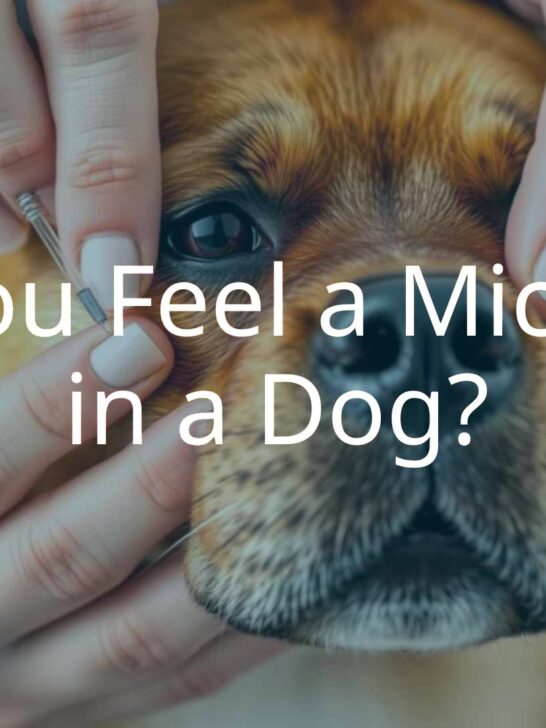Everything you Need to Know About Your 5-Month-Old German Shepherd
German Shepherds are loyal, intelligent dogs that make excellent companions. If you decide to add a GS puppy to your family and it happens to be 5-months-old, the following article is just for you.
We will discuss what to expect during your German Shepherd’s first five months and touch on nutrition, physical and behavioral changes, obedience training, and puppy health.
So let’s get started!
Average Size and Height
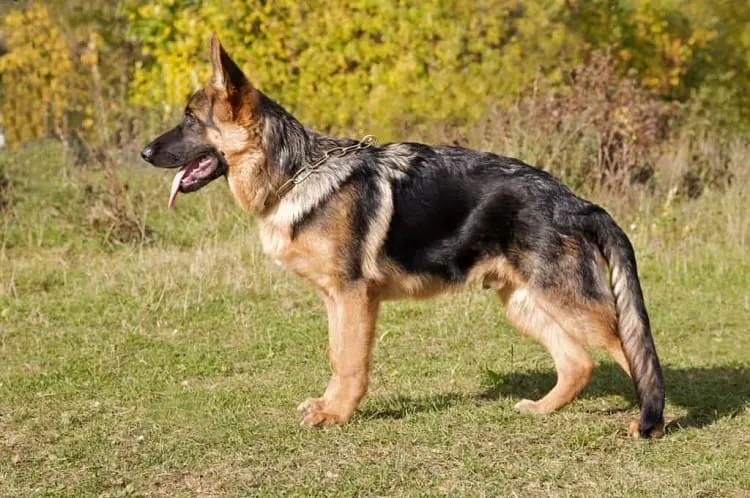
The average size of a 5-month-old German Shepherd is 12 to 26 inches tall and 35 to 49 pounds. However, there is a lot of variation in size among German Shepherd pups.
The average height of a 5-month-old puppy is also affected by its sex. A male German Shepherd is typically about 2 to 4 inches taller than a female German Shepherd.
In terms of weight, the average 5-month-old male German Shepherd weighs about 40 to 49 pounds, while the average 5-month-old female German Shepherd weighs 35 to 44 pounds.
Although they vary in size and weight, they are generally a medium to large dog breed.
Nutrition For 5-Month-Old German Shepherds
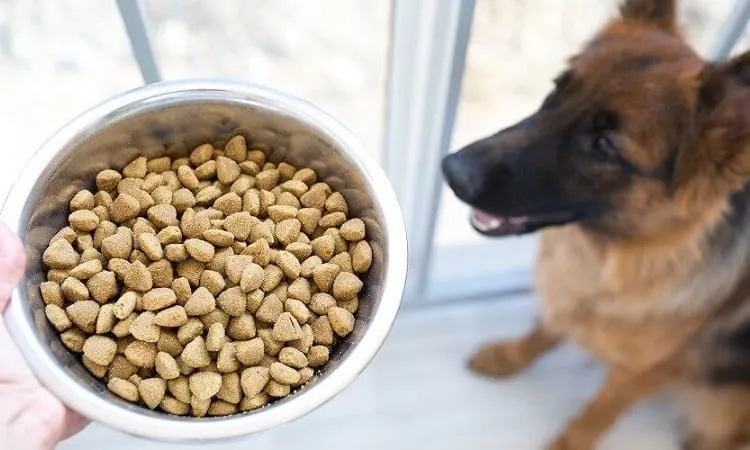
Choose high-quality food to ensure your pup gets the right balance of protein, fat, and nutrients. Puppies also need smaller meals more often than adult dogs, so divide their daily ration into 3-4 meals.
As your GS grows, you can transition them to an adult diet.
Give your German Shepherd puppy nutritious raw meats, fruits, and veggies at five months. Avoid giving them any poisonous meals and fatty goodies.
You can add other components to your puppy’s diet, like chopped liver and crushed animal bones. These ingredients will help your puppy develop natural immunity.
Make sure you’re not just sticking to a purely dry food diet.
Physical and Behavioral Changes
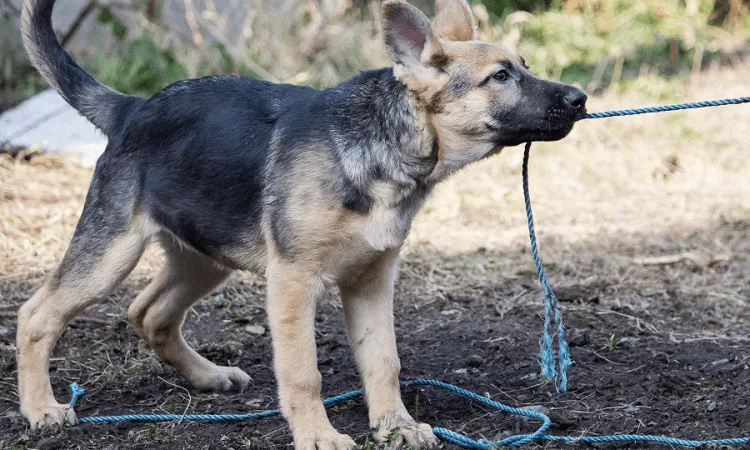
One of the most noticeable changes will be in size and weight. German Shepherds typically weigh between 35 and 49 pounds at five months old.
They’ll also start to fill out and develop more muscle definition.
German Shepherd puppies start losing their baby teeth during that time. It can be painful, and you may notice your pup chewing on toys or furniture.
It’s normal behavior, so don’t worry too much. Ensure you provide chew toys for your puppy to gnaw on.
Your German Shepherds pups also begin to “blow their coat.” It means they shed their puppy fur, and the thicker, coarser adult coat will start to grow.
You may brush your dog’s coat more frequently during this time, but it’s vital to help remove loose hair from the coat so it doesn’t become matted. Their ears should be standing up in most situations at this point.
5-month-old pups are usually full of energy and often get into trouble. Therefore, it’s important to provide them with plenty of entertainment and exercise.
They’re also increasingly curious about their surroundings and may start to explore more.
Finally, 5-month-old German Shepherds start to develop more of an independent streak. They may become less interested in cuddling and more interested in exploring their surroundings.
Male vs Female German Shepherd Pups
You can see notable differences between a male and a female German Shepherd at five months old.
A male German Shepherd is usually larger than its female counterpart. Males have bigger muscles, while females are more slender. Both males and females have an athletic build with no extra weight.
Male German Shepherds are more protective and aggressive due to their muscular structure and greater size. So for those who want a companion, a female German Shepherd is recommended.
A female German Shepherd tends to get along better with children owing to their more maternal, less aggressive disposition. Plus, a female German Shepherd is easier to train and has a greater capacity to socialize with other dogs and people.
Despite her intimidating appearance, the female German Shepherd is not as jealous or territorial as the male.
Both male and female German Shepherds are lively puppies that adore leaping. Both dogs must have moderate to high daily activity or become unruly.
If they do not consume excessive energy, they may bark, chew, walk around the home, and do other things to express their dissatisfaction.
Becoming Independent
Your German Shepherd is becoming more independent and may start to test its limits with you.
It is normal behavior for a German Shepherd puppy, as they begin to assert their independence and figure out their place in the pack.
Your German Shepherd will soon grow into a well-behaved adult dog with patience and positive training. You can help your puppy in this stage by being consistent with giving rules and boundaries.
Offer praise and affection when your puppy behaves well, and be firm but fair when they misbehave.
Meanwhile, continue providing plenty of play opportunities, as this will help burn off excess energy and keep your pup from getting into trouble.
Positive Reward-Based Obedience Training
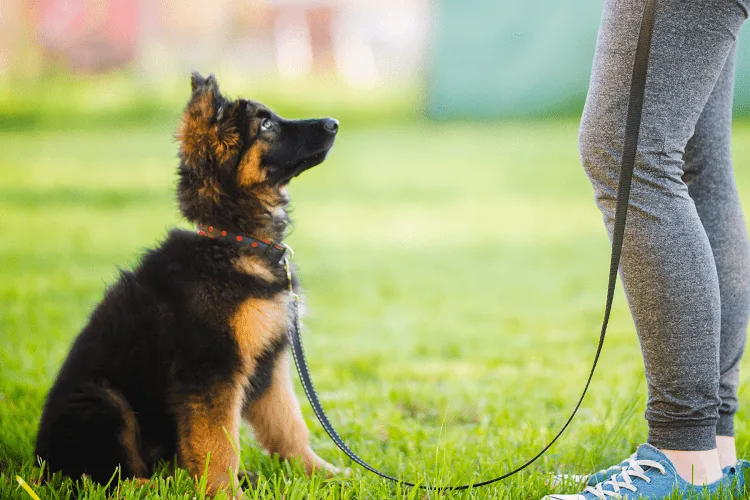
While they are loyal, protective, and intelligent dogs, German Shepherds can also be strong-willed and stubborn, making them difficult to train. That’s why using positive reinforcement is essential when doing dog training.
Positive reward-based obedience training is a training method that relies on rewards to reinforce good behavior.
With this kind of training, it is believed that the behavior is more likely to be repeated if a reward follows it.
The most common rewards used in this training are treats, but verbal praise and petting can also be effective.
Positive reinforcement-based training helps build a trusting relationship between owner and dog and encourages dogs to want to please their owners.
It is effective because it motivates dogs to learn new things to get the desired rewards.
Plus, it’s a lot of fun for both the dog and the owner! When done correctly, reward-based training can result in a well-behaved German Shepherd who is a joy to be around.
Chew Toys for Your 5-Month-Old German Shepherd
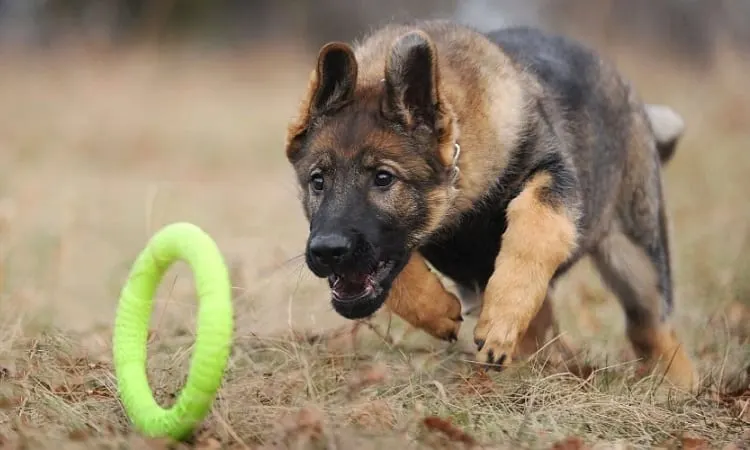
German Shepherds are notorious for being high-energy dogs and need lots of exercises to stay healthy and happy.
This dog breed also needs to chew on toys and bones to keep their teeth clean and their gums healthy.
Chewing is a great way to keep them occupied and prevent them from getting into mischief. In addition, chewing helps to relieve boredom and can provide mental stimulation.
If you’re looking for chew toys for your 5-month-old German Shepherd, you should keep a few things in mind.
First, choose a toy made from durable material that won’t easily break or tear. Avoid easily splintered or broken toys, as these could pose a choking hazard.
Do not give your puppy toys that are too small or too large for them.
Moreover, look for chew toys specifically designed for teething puppies, as these will usually have raised nubs or ridges that help to soothe sore gums. Also, ensure that the toy is appropriate for your pet’s age.
There are a lot of chew toys available on the market. You also have the option to create homemade chew toys for your puppy. For instance, you can create tug toys from an old sock or t-shirt.
You can do it by simply tying a knot in the fabric to create a loop. You can also freeze some of your dog’s favorite wet food or treats in an ice cube tray and give them one to chew on as a cool, refreshing treat.
Remember that even simple things like sticks and leaves can make great chew toys. Just make sure to supervise your puppy while playing with them, and avoid anything that could be sharp or dangerous.
5-Month-Old German Shepherd – Health Issues

German Shepherds experience many health problems during their first few months. Unfortunately, these problems can sometimes be severe and even deadly.
Here are some of the most common health issues for a 5-month-old German Shepherd.
Hip and Elbow Dysplasia
It is a condition that affects the joints, and it can be excruciating for dogs. Get your German Shepherd checked by a vet if you suspect they may have this condition.
Allergies
The allergy may be triggered by things like pollen, dust, or even certain types of food. It could be an allergy if you notice your dog scratching a lot or having trouble breathing.
Gastric Dilatation-Volvulus (GDV)
GDV is common in large, deep-chested breeds. It occurs when the stomach becomes bloated with gas or fluid and then twists on itself.
It can cut off the blood supply to the stomach and cause potentially fatal damage. Symptoms of GDV include restlessness, drooling, vomiting, and a distended abdomen.
Diabetes
A German Shepherd is particularly prone to diabetes due to its large size. Symptoms of diabetes include increased thirst, urination, and appetite, as well as weight loss and lethargy.
If not given attention and medication, diabetes can be fatal.
Panosteitis
If your German Shepherd has it, you will notice that he only uses three of his four legs or has other signs of lameness.
It appears between five and fourteen months of age and is generally referred to as growing pains. This condition is not hereditary or permanent.
Exercise Needs for 5-Month-Old German Shepherds
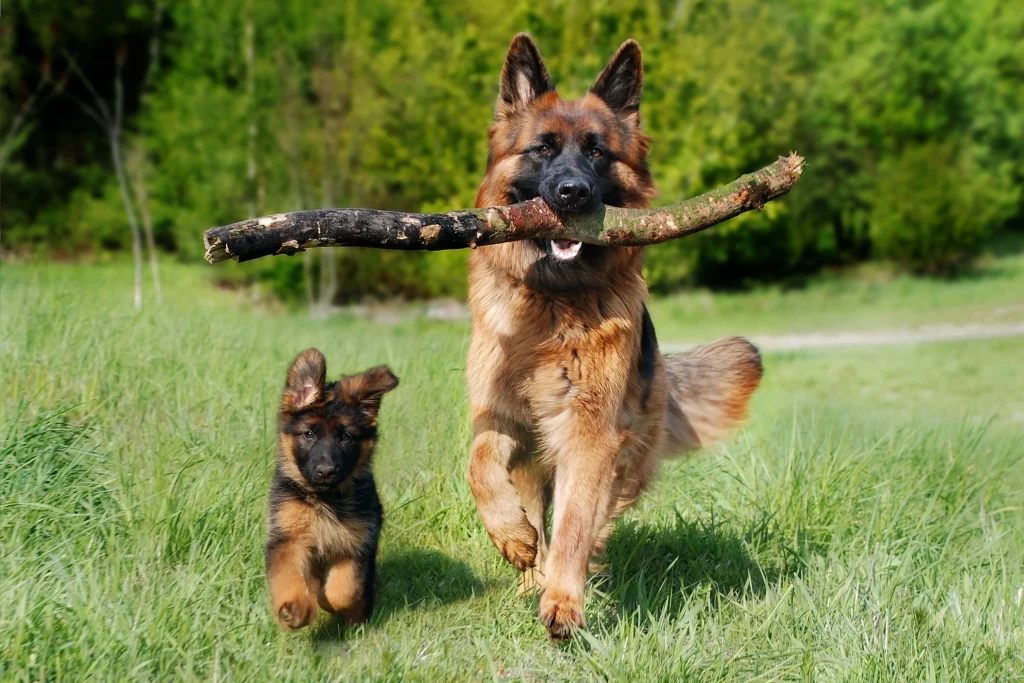
A German Shepherd puppy needs plenty of activities, especially when they’re young. If you’re considering getting a German Shepherd puppy, make sure you’re prepared to commit to its active lifestyle.
Five months old German Shepherd puppies need 25 to 30 minutes of exercise per day. It may seem like a lot, but remember that they were originally bred as working dogs, so they have a lot of energy to burn.
Another good way to exercise your puppy is by playing games such as fetch, puppy tug, or Frisbee. Just be sure to start slowly and gradually build up, as too much exercise can also harm a young dog’s health.
Also read:
- 7-Month-Old German Shepherd
- How to Take Care of a 4-Month-Old German Shepherd
- How to Take Care of a 3-Month-Old German Shepherd
Conclusion
German Shepherds are adorable and full of energy, but they also need plenty of exercises and proper nutrition to stay healthy and happy.
As your puppy grows and changes, keep an eye out for any health concerns or changes in behavior, and always consult your vet if you have any questions or concerns.
Resources:
FAQ:
1. What kind of food should I feed my 5-month-old German Shepherd puppy?
Answer: To ensure your puppy gets the right balance of protein, fat, and nutrients, choose high-quality food. Puppies also need smaller meals more often than adult dogs, so divide their daily ration into 3-4 meals. Additionally, puppies need nutritious raw meats, fruits, and veggies, but should avoid any poisonous meals and fatty goodies.
2. How much exercise should I give my 5-month-old German Shepherd puppy?
Answer: German Shepherd puppies need 25 to 30 minutes of exercise per day, which can be in the form of a walk or playing games such as fetch or Frisbee. Start slowly and gradually build up, as too much exercise can harm a young dog’s health.
3. What are some common health issues that 5-month-old German Shepherds can face?
Answer: Some common health issues include hip and elbow dysplasia, allergies, gastric dilatation-volvulus, diabetes, and panosteitis. If you notice any sign of these or other health concerns, it is best to consult a vet.
4. What kind of chew toys should I give my 5-month-old German Shepherd puppy?
Answer: Choose a chew toy made from durable material that won’t easily break or tear. Avoid easily splintered or broken toys that could pose a choking hazard. You may also want to look for chew toys specifically designed for teething puppies, which will usually have raised nubs or ridges that help to soothe sore gums. Additionally, you can create homemade toys, such as tug toys made from old socks or t-shirts.
5. How should I train my 5-month-old German Shepherd puppy?
Answer: Positive reward-based obedience training is essential when training German Shepherds. This method relies on rewards like treats to reinforce good behavior, which motivates dogs to learn new things to get the desired rewards. Positive reinforcement-based training builds a trusting relationship between you and your dog and encourages it to want to please you. When done correctly, reward-based training can result in a well-behaved German Shepherd who is a joy to be around.
















